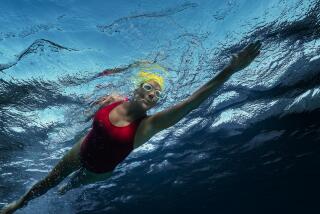Spitz Gets Swamped in Comeback
- Share via
MISSION VIEJO — Nineteen months of suspense ended with barely a splash Saturday as Mark Spitz returned to swimming in front of 1,800 at the Mission Viejo International Sports Complex.
Shortly after 2 p.m. Spitz appeared, followed 10 minutes later by his younger opponent, Tom Jager. After television interviews and a warmup, the two mounted the blocks and ended all speculation about what a 41-year-old can do after a 19-year layoff against world-class competition.
It was over in the first 15 meters of the 50-meter butterfly race.
Jager, who is reputed to be the quickest starter in the world, was off the blocks and out in front by a full stroke within that span. At the halfway point, the 26-year-old led by two strokes as Spitz struggled to make a dent in the lead.
Although Spitz said afterward that he lost all the ground at the start, Jager clearly was gaining until the end.
The former UCLA star finished in 24.92 seconds. Spitz touched in 26.70, a differential of 1.78 seconds, or 1 1/2 body lengths.
Although there are no 50-meter butterfly times to compare it to because it is not an Olympic event, the difference between first-place and eight-place at the U.S. National Championships last week in the 50-meter freestyle was 1.06 seconds.
Spitz’s mark at the halfway point of the 100 butterfly at the 1972 Olympic Games in Munich was 25.38, which was his goal against Jager.
Long after he touched the wall, Spitz stared at the clock.
“I couldn’t believe I swam that slow,” he said. “I didn’t feel slow.”
Spitz described the feeling as the worst he has felt since the 1968 Olympic Games in Mexico City, when as the 200 butterfly world record-holder he finished first in the preliminaries but last in the finals.
Spitz, winner of seven Olympic gold medals in 1972, earned $10,000. Jager, the 50-meter freestyle world record-holder, won $20,000, his biggest payday ever.
“Yeah, I’m a little disappointed,” said Spitz’s coach, UCLA’s Ron Ballatore. “I thought he’d do better, but not to the extent you want to throw it in because he’s worked hard.
“I knew he’d have a hard time beating Tom, but I felt he’d be closer. His stroke was much too short. He hasn’t looked like that in practice. Nerves had a lot to do with that.”
Spitz, who was known for intimidation in his heyday, was so unsure of himself that he got into water before the race, apparently only because Jager had done so.
Although Spitz and Ballatore would not reveal any practice times, both said afterward that he went a second faster last week.
“I have to control my nerves,” Spitz said. “I usually have control. I’m not discouraged . . . In a way I wanted this over. I had to get this out of the way. This experience is super valuable.”
Spitz will need it April 27 in Mission Viejo when he races Matt Biondi, the 1988 Olympic silver medalist in the 100 butterfly.
“I’m sure it’ll be different,” Spitz said. “It couldn’t get worse.”
Eventually, Spitz plans to swim a 100 butterfly. He needs to finish in 55.59 seconds or better to qualify for the 1992 U.S. Olympic Trials
“If that’s the best he’s got, he’s in deep trouble,” Olympian John Naber said, “but I don’t think it is. Thirty seconds before the race he was so nervous and he swam nervous . . . tight and short.”
Jager said: “My hat’s off to Mark, he didn’t have to pick me. He picked one of the best in the world to race. That takes a lot of guts.”
Reporters from Japan, Austria, Germany, Switzerland, Sweden, England, France and Italy covered the race. Many said they wouldn’t be back in two weeks when Spitz takes on Biondi.
More to Read
Go beyond the scoreboard
Get the latest on L.A.'s teams in the daily Sports Report newsletter.
You may occasionally receive promotional content from the Los Angeles Times.






